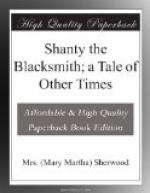Tamar accordingly heard low voices, speaking, as it were in the mouth of the cavern, and then a voice of one without the cavern—of one as in the act of departing, saying distinctly, “twelve then at midnight!” The answer from within did not reach Tamar’s ears, at least, she heard only an indistinct murmur, but the voice without again came clear to her, and the words were to this effect, “I will not fail; I will take care that he shall be in no condition to return;” the answer was again lost to Tamar, and probably some question, but the reply to this question was clear. “It is his day to go,—the garrison can’t live without provision,—if he don’t go to-day, we must skulk another twenty-four hours,—we must not venture with him, there will be murder!” then followed several sentences in such broad slang, as Tamar could not comprehend, though she thought she understood the tendency of these words, which were mixed with oaths and terms so brutal, that her blood ran cold in thinking of them; “Caught in his own snare,—he will sink in his own dyke,—we have him now, pelf and all.” After this, Tamar heard parting steps, and various low rumbling noises as if proceeding from under ground; then all was still, and no farther sound was heard by her, but the rustling of leaves, the chirping of birds, and the cropping of the herb by the incisors of Brindle. In the mean time the morning broke, the light of day was restored, and Tamar creeping gently from her hiding-place, left Brindle, whilst she ran back to the cottage.
She had not gone far, before she met the labourer who was accustomed to assist her in the care of the garden. She told him that the cow had strayed to the knoll, and that she had seen her enter among the trees; and he undertook, with his dog, to drive her back to the glen, though, he said, he would on no account go up on the knoll, but his dog would drive her down, and he would see her home.
“And why not go on to the knoll?” said Tamar. The man replied, that the place was known to be uncanny, and that not only strange noises, but strange sights had been seen there.
“Lately?” asked Tamar, “have they been seen and heard lately?”
The poor man could not assert that they had, and Tamar was not going to tell him what she had seen and heard. No! this mystery was to be left for the consideration of Dymock and Shanty, and she was anxious to know if their thoughts agreed with hers.
When she arrived at the cottage, and the labourer had brought back Brindle, and fastened the gate, and Tamar had milked her cow, and done her usual services, she went to Dymock who was just awake, and brought him out to breakfast with Mrs. Margaret, “You shall not say any thing about posterity, and the benefits which you are doing to them by recording your thoughts, this morning, sir,” she said, “but you shall hear what I have to tell you, and I will not tell you, but in the presence of Mrs. Margaret.” When Dymock heard what Tamar had to say, he was at




